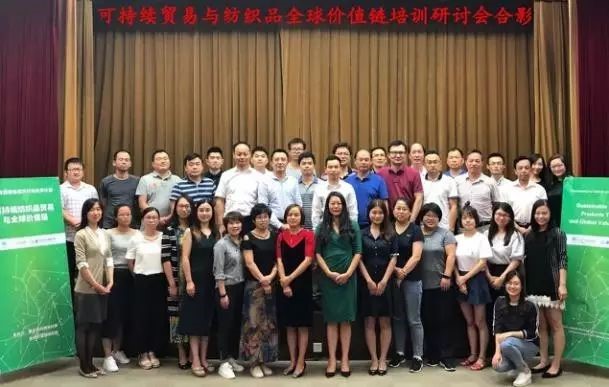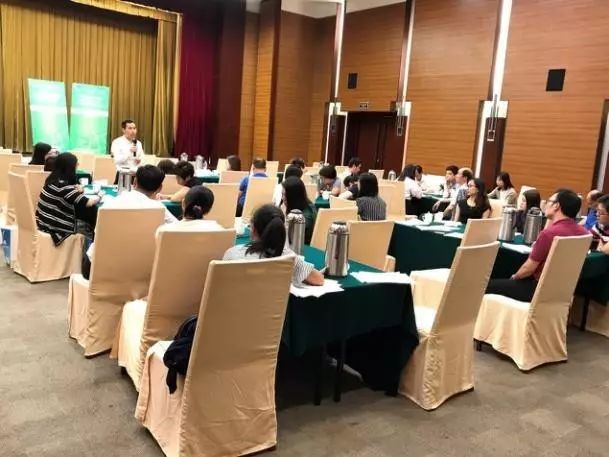
English | 中文

Green trade training in Jiangsu focuses on sustainable textile trade and global value chains
source:goldencsr date:2017-10-12 15:03:29
In 12-13 September 2017, a two-day training on Sustainable Textile Trade and Global Value Chains was held by UN Partnership for Action on Green Economy (hereinafter referred to as PAGE) in Suzhou, Jiangsu Province, China.
This training was jointly hosted by the Environment and Trade Hub of UN Environment, Research Institute for Global Value Chains and Suzhou Bureau of Commerce, co-hosted by International Trade Centre (ITC) and China National Textile and Apparel Council (CNTAC).
The training was supported by the Environmental Protection Department of Jiangsu Province, Department of Commerce of Jiangsu Province, Trade Development Bureau of Ministry of Commerce of China, China National Textile And Apparel Council (CNTAC), International Labor Organization (ILO), United Nations Industrial Development Organization (UNIDO), United Nations Conference on Trade and Development (UNCTAD), China National Cleaner Production Centre (CNCPC), China Association for Standardization (CAS), Natural Resources Defense Council (NRDC), China WTO Tribune, Sino-Swedish Corporate Social Responsibility Website, and China-Germany Centre for Sustainable Development.
The training aimed to enhance the understanding of textile enterprises on sustainable trade and value chain management, and promote textile industry to fulfill social responsibility and carry out practices for sustainable development. 37 enterprises participated in the training, 80% of which engage in the textile & apparel production and exports, including upstream and downstream industries, such as fiber, dyeing, weaving, garment making and other production processes. Among the companies, 13 participant companies are large-sized enterprises, including the leading garment and clothing producers in China, 11 are medium-sized enterprises.
The training covered 12 leading topics on sustainable textile trade and value chains, such as international frameworks, methods and tools on the analysis and management of textile trade and value chains, chemical use, Sewage treatment and energy use, etc. The discussions focusing on labor aspects, employment, gender and women empowerment, and competitiveness of SMEs were organized.
During the training, Ms. Dai Yibo, social responsibility expert from GoldenBee CSR Consulting, gave a training on “Textile enterprises and social responsibility”. The social responsibility concept and excellent practices on responsible competitiveness delivered by Ms. Dai in this training got the recognition and resonance from the participant companies, and generated representatives’ wide discussion.
Participant enterprises proposed that enterprises should not only practise responsibilities at the enterprise level, but also implement CSR at the employee level.

In addition, the representatives of textile enterprises proposed that, in the cooperation of sustainable trade and global value chains, and the process of performing CSR, the enterprises face complex situations. Multi-stakeholder cooperation among enterprises, government, industry associations, NGO, research institutions should be achieved to further push forward green trade and global value chain cooperation in the textile industry, to promote the better integration of social responsibility concept into the planning and operation of textile enterprises.
The upgrade of value chain and green transformation in textile industry depends on joint efforts from enterprises, government, industry associations, etc. This training helps to raise the awareness of textile industry in Jiangsu to participate in the development of sustainable trade and global value chain, share and promote good experience of green development and transformation and upgrade in textile industry, which is of great significance for them to participate in green trade and global value chain.
About the Sustainable Textile Trade and Global Value Chains project in Jiangsu:
The textile industry is one of the pillar industries in Jiangsu and has been playing an important role in Jiangsu’s economy, exports, industrial upgrading, as well as its transition to an Inclusive Green Economy. Jiangsu is also one of the leading provinces in China in textile production and export, taking up around 20% of total textile exports in China. The Development Plan for Textile Industry in Jiangsu released in 2016 outlined main objects and focus areas for development of textile industry in the period of the 13th Five Year Plan. It highlighted the importance of the green and sustainable development of the textile industry and the opportunities arising from upgrading export structure while moving up along the global value chains. Under this context, the Environment and Trade Hub, in partnership with the Research Institute of Global Value Chains initiated a project to improve the capacity of textile companies in Jiangsu Province to better understand the sustainable trade and value chain development opportunities in the textile sector. It will assist Jiangsu’s efforts in the transition towards an Inclusive Green Economy and achieve its goals about industrial upgrading and green development as outlined in the provincial 13th Five Year Plan.
About Environment and Trade Hub of UN Environment
Launched in 2015, the Environment and Trade Hub serves as the overarching delivery mechanism for UN Environment’s work on trade. As a demand-driven mechanism, the Environment and Trade Hub offers capacity building and related policy advice on sustainable trade and investment that are tailored to local needs and circumstances. Its mission is to enable countries to use trade and investment as vehicles for achieving the 2030 Agenda for Sustainable Development.
About Partnership for Action on Green Economy (PAGE)
In order to response to the outcome of Rio+20 ? the future we want, which identified green economy as an effective tool to achieve sustainable development and eliminate poverty, PAGE was then jointly launched by five UN agencies ? UN Environment, International Labour Organization, UN Development Programme, UN Industrial Development Organization, and UN Institute for Training and Research. It aims to support related nations and regions in making and implementing green economic policies and strengthening participating countries’ capacity on implementing the initiative of inclusive green economy, to develop and provide kits or tools used for achieving green economy worldwide, and to generate and share related knowledge to support the implementation of green economy at national level. PRCEE is the coordinating agency for PAGE project in China.